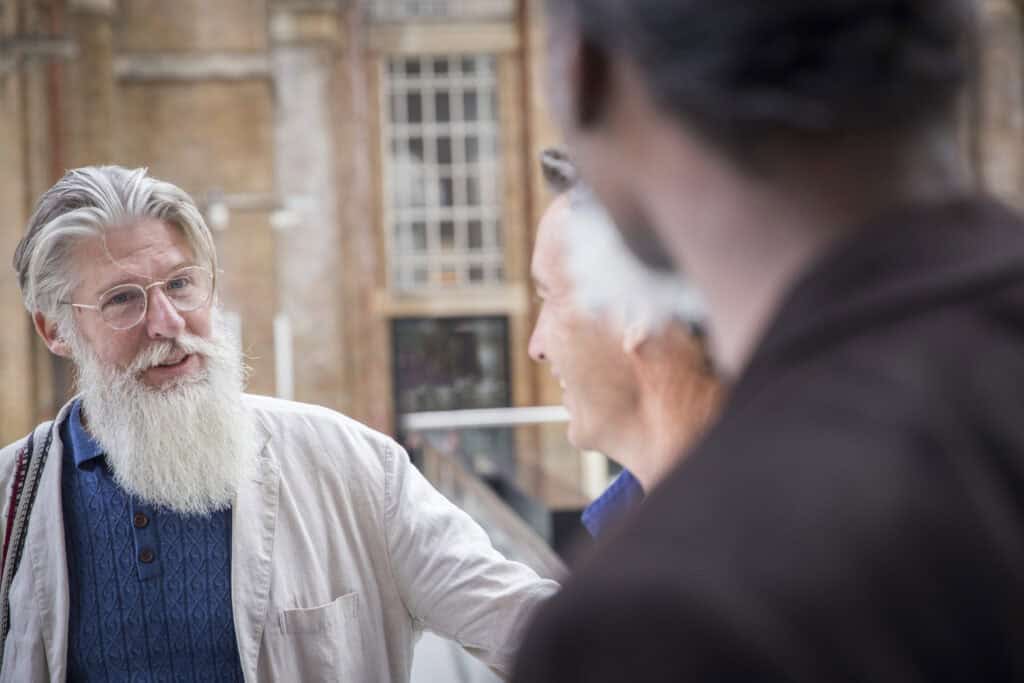Have you ever wondered who the greatest logical minds in history are?
From Aristotle to Alan Turing, history has seen brilliant logicians whose contributions to philosophy, mathematics, and artificial intelligence have shaped the modern world. Their groundbreaking ideas in syllogistic reasoning, Boolean algebra, and computational logic continue to influence scientific discovery and AI development today.
Neuroscience Insight
Logical reasoning is deeply connected to cognitive processing, particularly in areas of the brain like the prefrontal cortex, responsible for decision-making, pattern recognition, and problem-solving. Neuroscientific research supports the claim that individuals who engage in complex reasoning tasks show increased neural activity in this region. Studies also suggest that structured logical training can increase brain connectivity and cognitive flexibility, reinforcing the significance of logical reasoning in intelligence and innovation.

Aristotle: The Father of Formal Logic
Born in 384 BCE in ancient Greece, Aristotle was a philosopher and polymath whose contributions laid the groundwork for logical reasoning. His most notable work in logic, the Organon, introduced syllogistic logic, a system that became the foundation of deductive reasoning. Aristotle’s logical structures allowed scholars to analyse arguments based on premises and conclusions, a method that continues to be used in modern philosophy, mathematics, and artificial intelligence.
Key Contributions:
- Syllogistic Logic: Aristotle’s system of deductive reasoning laid the groundwork for logical argumentation and continues to be foundational in philosophy, mathematics, and AI.
- Scientific Method: While not directly formulating the modern scientific method, Aristotle’s emphasis on empirical reasoning influenced its later development.
- Categorical Thinking: His classification of knowledge shaped disciplines in ethics, metaphysics, and political science.
- Influence on Theology and Law: His methods of logical deduction were later adopted by medieval scholars, including Thomas Aquinas, whose works bridged Aristotle’s logic with religious philosophy, shaping theological discourse in the West.
Highlighting Legacy Across Generations
Although this piece focuses on intellectual contributions, it’s important to note how logical traditions are passed down intergenerationally—through formal education, philosophical schools, and cultural transmission.
These thinkers didn’t just shape logic; they influenced entire lineages of reasoning that ripple through time—from ancient debates in the Lyceum to modern STEM classrooms.
Understanding logic’s familial legacy reinforces its role not just in personal cognition, but also in shaping how generations learn, question, and solve problems together.

Other Influential Thinkers Who Advanced Logical Reasoning
While Aristotle stands at the forefront of logical thought, other brilliant minds have made significant contributions:
René Descartes (1596-1650)
- Often called the Father of Modern Philosophy, Descartes developed the concept of rationalism, emphasising logic and reason as the foundation for knowledge.
- Famous for his statement “Cogito, ergo sum” (I think, therefore I am), which asserted that logical reasoning was proof of existence.
- His Cartesian coordinate system merged algebra and geometry, laying the foundation for analytical mathematics.
Gottfried Wilhelm Leibniz (1646-1716)
- While Descartes emphasised rationalism as the foundation of knowledge, Leibniz extended this approach by developing symbolic logic and the binary system, which would later become crucial in computational logic.
- Proposed the principle of sufficient reason, a key philosophical concept in rationalism that asserts that nothing happens without a reason.
- Designed a mechanical calculator that could perform complex mathematical operations, showcasing the practical applications of logical structures.
- Leibniz’s exploration of symbolic logic and binary systems laid the groundwork for future mathematical logic, which would later be expanded by George Boole into Boolean algebra – the foundation of modern computing.
- His symbolic system influenced future generations of computer scientists, revealing how one thinker’s logic can become another’s blueprint.
George Boole (1815-1864)
- Created Boolean algebra, the mathematical logic that underpins digital circuits, modern computing, and artificial intelligence.
- His work laid the foundation for Claude Shannon’s information theory, which is essential to digital communication.
PAUSE AND REFLECT
Think of a moment when logical reasoning helped you navigate a tough decision – whether in a debate, problem-solving at work, or making a big life choice.
How did structured reasoning influence your outcome?
Bertrand Russell (1872-1970)
- Co-authored Principia Mathematica with Alfred North Whitehead, aiming to ground all mathematics in formal logic.
- Advocated for rigorous logical analysis in philosophy and language, influencing movements such as analytic philosophy and logical positivism.
Kurt Gödel (1906-1978)
- Developed Gödel’s incompleteness theorems, proving that no formal mathematical system can be both complete and consistent.
- His work reshaped mathematical logic, demonstrating the limits of axiomatic systems and influencing debates in philosophy, artificial intelligence, and theoretical physics.
To explore how embracing cognitive paradoxes can lead to deeper growth, read Embracing Imperfection and Self-Acceptance.
Alan Turing (1912-1954)
- Revolutionised logic and computation by formulating the concept of the Turing machine, which became the theoretical model for modern computers.
- Played a crucial role in deciphering the Enigma code during World War II, using logical analysis to break Nazi encryption systems and significantly aiding the Allied victory.
- Laid the groundwork for artificial intelligence by proposing the Turing Test, a method for assessing machine intelligence.

How Logical Reasoning Continues to Shape AI & Modern Science
The ideas developed by Aristotle and other logical minds have shaped fields ranging from mathematics and computer science to artificial intelligence and law. Logic remains essential in:
- Programming & AI Development: Boolean logic and algorithmic reasoning form the basis of modern AI.
- Ethics & Law: Legal arguments are built upon deductive reasoning, a principle first formalised by Aristotle.
- Cognitive Science: Understanding how the brain processes logic helps in improving artificial intelligence and decision-making models.
- Philosophy & Epistemology: Logical frameworks continue to shape debates about knowledge, existence, and truth.
AI’s reliance on logic-based algorithms raises ethical concerns, particularly in decision-making systems like predictive policing, automated hiring, and healthcare diagnostics. Ensuring fairness in AI-driven logic requires addressing biases in training data and transparency in algorithmic processes. For example, studies have shown that AI-driven hiring systems have sometimes displayed biases against gender and ethnicity due to flawed training data. Ensuring fairness in AI-driven logic requires addressing biases in datasets and increasing transparency in decision-making processes.
Ethical frameworks, such as the EU AI Act and UNESCO’s AI Ethics Guidelines, aim to regulate how logical structures in AI impact human lives. Logic is about ensuring justice and fairness in an automated world.
Natural Systems in Logic
However, logic systems today often omit ecological reasoning or place-based ways of knowing.
Natural systems metaphors—like feedback loops, cycles, and symbiosis—are common in ecosystems science but underused in mainstream logic discourse. Integrating bioregional epistemologies or Indigenous logic models (e.g., relationality, holism, observation-based inference) could offer richer, contextual forms of reasoning that align with sustainability and planetary ethics.
For instance, Māori or First Nations knowledge systems value cyclical reasoning and responsibilities to land—forms of logic embedded in ecological relationships.

Cultural Connection
Logical reasoning is not only an intellectual pursuit – it has shaped societies and cultures. Ancient Indian and Chinese philosophy also developed rigorous logical traditions. Nyaya logic in India, developed by Gautama (circa 2nd century BCE), introduced rigorous inferential reasoning that emphasised debate, hypothesis testing, and epistemology. This system contributed to the structured formulation of arguments, influencing later philosophical and scientific reasoning.
Similarly, Mohist logic in China (circa 4th century BCE) focused on deductive argumentation and ethical rationalism, influencing early legalist thought and governance structures. Both traditions highlight that logic is not exclusive to the Western tradition but a global intellectual pursuit.
These traditions illustrate that logic is transmitted across generations and civilisations, with each lineage adapting and evolving reasoning tools to fit context and culture. For insights into how logic and empathy intersect across cultures, explore Empathy Across Cultures.
Final Thoughts
While many great minds have contributed to logical reasoning, Aristotle remains the most influential figure in the history of logic. His systematic approach to argumentation and classification laid the groundwork for centuries of intellectual advancement.
From philosophy to artificial intelligence, the legacy of logical thinkers continues to shape the way we analyse, interpret, and navigate the complexities of our world. The ability to think critically and reason logically remains one of humanity’s most powerful tools in understanding reality.
To strengthen both rational thinking and emotional balance, see The Science of Emotional Resilience.

Reflect
Fascinated by logic and reasoning?
Share this legacy with a friend, student, or child—it’s a gift that grows across generations.
References:
- Baxter, P. (2018, May 21). 10 of the Greatest Minds of History. History Collection. https://historycollection.com/10-of-the-greatest-minds-of-history/
- Labh, S. (2022, November 3). 5 most influential logicians in the history of humankind. Medium. https://piggsboson.medium.com/5-most-influential-logicians-in-the-history-of-humankind-8b34a95ed8aa
- Restall, G., (2004, January). Great moments in logic. Consequently https://consequently.org/writing/logicians/
- Novel Investor. (2024, May 22). The Greatest Minds and Ideas of All Time by Will Durant. https://novelinvestor.com/notes/the-greatest-minds-and-ideas-of-all-time-by-will-durant/
- Merchey, J. (2022, March 30). Ten of History’s Greatest Thinkers. Values of the Wise. https://valuesofthewise.com/ten-of-historys-greatest-thinkers/
- UoPeople, W. O. (2024, August 15). 10 Greatest philosophers of all time. University of the People. https://www.uopeople.edu/blog/greatest-philosophers-of-all-time/
- Mackey, A. P., Singley, A. T. M., & Bunge, S. A. (2013). Intensive reasoning training alters patterns of brain connectivity at rest. Journal of Neuroscience, 33(11), 4796–4803. https://doi.org/10.1523/jneurosci.4141-12.2013
- Intro to Indian Philosophy Review. Fiveable. (2024, July 25). https://fiveable.me/introduction-indian-philosophy/unit-7/nature-inference-debate-nyaya/study-guide/rT2UqvfIcVXMQumz
- Mohist Canons. Stanford Encyclopedia of Philosophy. (2024, September 2). https://plato.stanford.edu/entries/mohist-canons/
- Kalat, J. (2009). Biological Psychology. Wadsworth, Cengage Learning. godsonug.wordpress.com/wp-content/uploads/2016/09/james-w-kalat-biological-psychology-ninth-edition-wadsworth-publishing-20062-compressed.pdf
This piece was written for you by
Making complex ideas accessible and sparking meaningful conversations.
